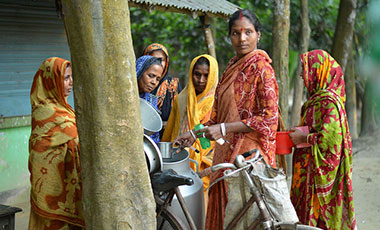
Back
Who we are
With research staff from more than 60 countries, and offices across the globe, IFPRI provides research-based policy solutions to sustainably reduce poverty and end hunger and malnutrition in developing countries.

researcher spotlight
Carlo Azzarri is a Senior Research Fellow in the Innovation Policy and Scaling Unit. His work focuses on the relationships among poverty, nutrition, food security, agriculture, the environment, production, and migration—analyzed at both micro and macroeconomic levels, primarily using quantitative methods.

Back
What we do
Since 1975, IFPRI’s research has been informing policies and development programs to improve food security, nutrition, and livelihoods around the world.

Back
Where we work
IFPRI currently has more than 600 employees working in over 80 countries with a wide range of local, national, and international partners.
Unit
Policies, Institutions, and Markets (PIM)

Poverty and hunger remain enormous challenges. Nearly 1 billion people in the world go hungry, and more than 1 billion live on just $1.25 a day. Seventy-five percent of the poor live in rural areas, and the majority of them depend on agriculture for their livelihoods. At the same time, food prices are high and rising, which will present a sustained challenge to food security in coming years.
One of the most promising tools for promoting development and reducing poverty—pro-poor, sustainable agricultural growth, particularly for small producers—has been underexploited. Evidence shows that agricultural growth reduces poverty by twice the rate of growth in nonagricultural sectors, but this growth has been constrained by failures related to policies, institutions, and markets and will be further challenged by emerging trends such as climate change and natural resource scarcity. Past agricultural growth has also been limited by a narrow focus on the sector that excluded macroeconomic dimensions, environmental inputs and outcomes, and important enabling conditions, such as rural infrastructure, effective markets, and complementary services such as credit and agricultural extension.
The purpose of the Policies, Institutions, and Markets (PIM) research program is to establish how these challenges and failures can be overcome to most effectively reduce poverty, improve food security, and grow small producers’ incomes. Since developing countries face a tremendous variety of development challenges and also vary greatly in their policy, institutional, and market capacities, the program has a strong focus on supporting country-led, country-driven, and country-owned development through collaborative research, partnership, and capacity building.